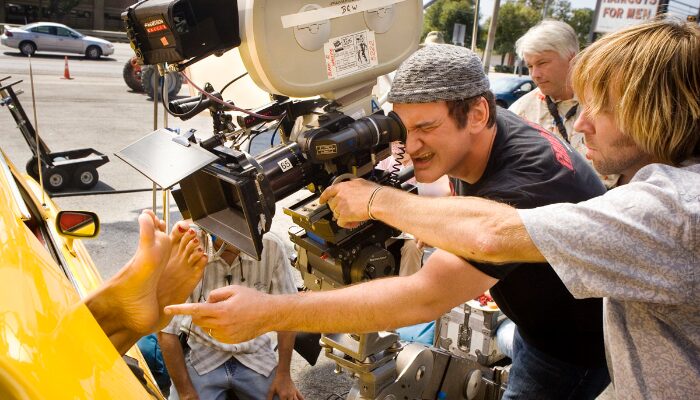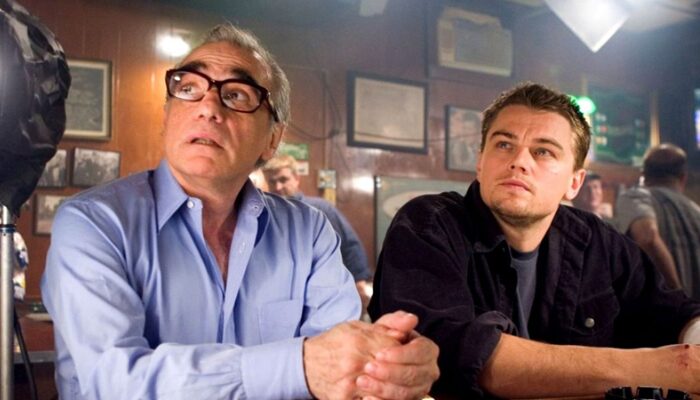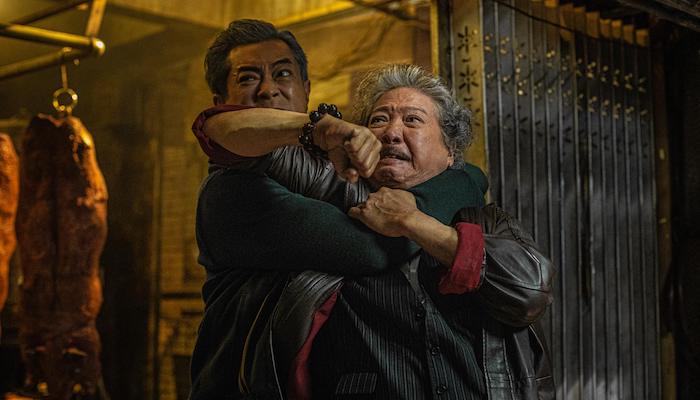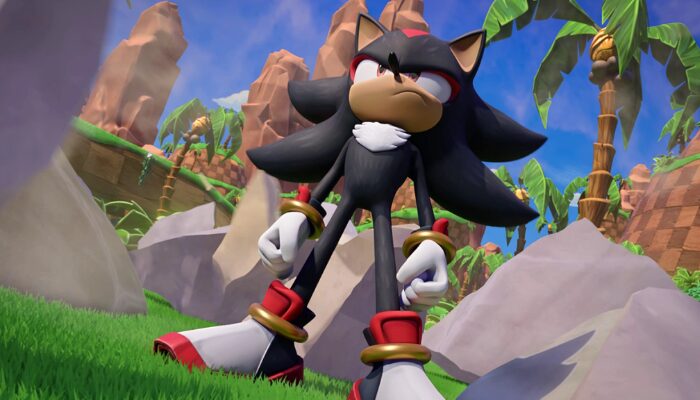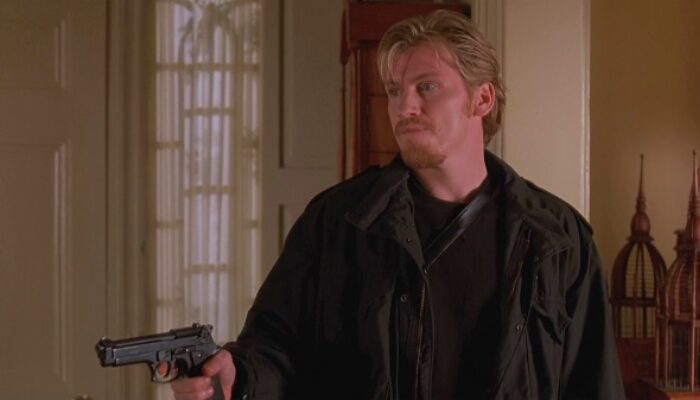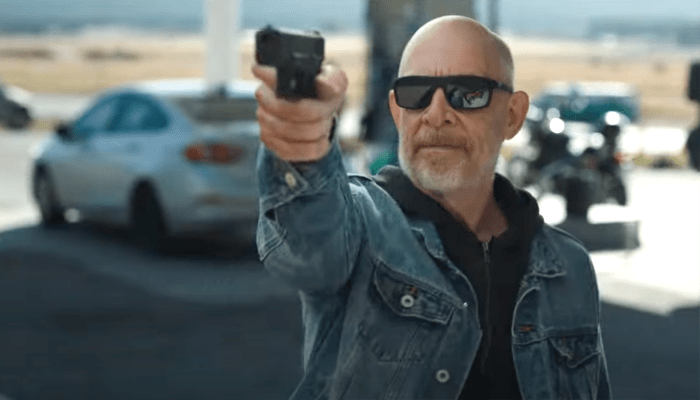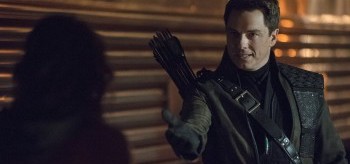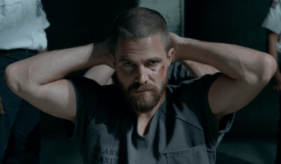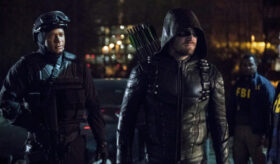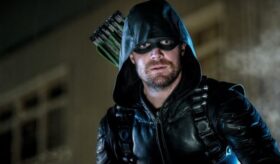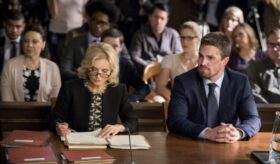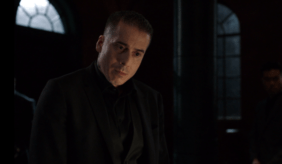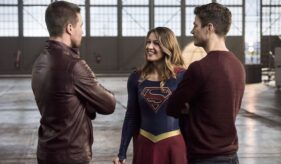TV Review: ARROW: Season 2, Episode 22: Streets of Fire [The CW]
The CW’s Arrow Streets of Fire TV Show Review. Arrow: Season 2, Episode 22: ‘Streets of Fire’ (no relation to the film) took the second season of Arrow into all-out-war mode; with Mirakuru operatives getting their masks on (and ‘roid rage out) at key locations across the city, playing into new Mayor, Sebastian Blood’s (Kevin Alejandro), intended role as the city’s savior. The real mastermind, Slade (Manu Bennett), had other ideas. Caught up in the opening terror spree were Quentin Lance (Paul Blackthorne), in a familiar Trojan Horse gambit, at the precinct, and Thea Queen (Willa Holland), at the station, before she could leave town. Being assaulted by one of Slade’s Mirakuru men turned out to be the least traumatic development to her night.
Things would have been worse for the city’s residents had Oliver (Stephen Amell) and Laurel (Katie Cassidy) not brought the house down on the bulk of the deploying horde; but they both got caught under the debris, in the process. Oliver managed to crawl out; Laurel’s extrication, however a much needed confidence builder, was a stretch.
The Canary (Caity Lotz) returned to once again protect her family, but really only served to exercise Laurel’s new inner strength. After providing some good press, for the masked community, Sara was content to switch back to the role of sister/ daughter, while Laurel and Quentin shared lead on the civil authority rally. Just as well, since another key side-character to the series has now been added to the late-season kill list (and will never live up to the source material).
Rounding out the initial match-ups were Diggs (David Ramsey) and Felicity (Emily Bett Rickards), finding themselves in Isabel Rochev’s (Summer Glau) sights; Isabel having undergone a Mirakuru resurrection (made necessary by Diggs) to become Ravager.
I’ll just come out and say it: Ravager was a bad idea. Never mind that she brings little more to the storyline than serving as Slade’s Mirakuru side-kick, and just looks ridiculous in the partial mask (frankly, Glau looks more intimidating, all suited up, without it), the character of Isabel Rochev was wasted on this turn. They source characters are two different people, and while turning Rochev into Ravager played into this season being all about Oliver & Slade, it squandered her potential for the series, as a whole. Unlike Slade Wilson, the source character of Isabel Rochev is a dedicated Green Arrow villain (Slade being a cross-over title threat), and in her capacity as The Queen: usurper of Oliver’s family fortune, could have served as a subtle foil to The Arrow in the long run. As it stands, she now seems on course to be another disposable asset, conformed to this one season. It seems the show runners have other characters in mind, regarding long-term antagonists.
As for the current big bads, ‘Streets of Fire’ meant a point of no return, for one, and a death-bed conversion for another. With S.T.A.R. labs keeping itself relevant (“The Flash: coming soon, kids”), a means of dealing with the Mirakuru threat – including Roy (Colton Haynes) – became an episode focal point. Around this point, Blood came to the conclusion that, for all of Slade’s master chessman planning, he was insane. Villain or not, Blood considered himself a man of high-minded principle. Slade’s single-minded mission of vengeance – at everyone’s expense – rendered Blood’s principles moot.
It is exactly that single-mindedness that I’ve been having a problem with. Given Slade Wilson’s stature, in both source role & character, I’ve found him being reduced to a drug induced madman, and the tying of Deathstroke entirely to Oliver Queen, a downgrading of the character – super powers or not. What was shaping up to be a clash of some of the DCU’s greatest street fighters has becoming partially bogged down by psycho-emotional baggage. A looser interpretation of Deathstroke may be better than nothing; but there can be only so much loosening of a character before that character begins to be in-name-only (and with Cyrus Gold, aka Solomon Grundy, Arrow had already used up its downgrade license for the season).
If the Deathstroke spiral has taken away from the season’s big payoff, so far, then his Mirakuru army added up to a big disappointment. The threat presented by a multitude of ex-cons, with Slade’s powers, represented a no-win scenario for Team Arrow and the city. While it’s clear that Slade’s elite military training makes for a huge difference, and his army lacks the skill to truly match his threat level, on an individual basis, his Mirakuru troops have come across as stiff, slow, and slow-witted. Whether it’s walking into weapons fire (just walking into action, in general), or just staring at armed grenades, they were little more than zombies. Cyrus Gold was no more animated, sure, but Roy was noticeably faster and more limber, suggesting a fine tuning of the process. Maybe free will was a factor; but the fact remains that Slade’s army came across more as a lumbering mass of hooligans, than super soldiers. Throw in the under-representation of their activities, city-wide, and the “streets of fire” seemed more like a soccer riot, than a reign of terror.
Underscoring this point was the fact that the reappearance of Malcolm Merlyn (John Barrowman) brought some flare to the episode. Arrow’s second season has basically been a slow burn; with Oliver circling the drain of his own guilt, over past & present events, and Slade emphasizing menace over direct action. Merlyn, however, displayed a lot of charisma, for a dead man. Chock it up to Barrowman’s performance, I suppose, but he even managed to bring some energy to the thankless role of placating an understandably horrified Thea. His rescue of, and outreach to Thea marked a point of departure, from arch-villain to possible redemption, and stands to bring to the show something it may desperately need: an anti-hero.
The Green Arrow had long been intended to be an anti-hero; a leftist version of Batman, that operated outside the conventions of the arch-typical hero. Arrow has taken great pains to reverse that formula, making Oliver Queen obsessed with redeeming himself as a true do-gooder. In some respects, the effort has drained the life out of the role. The prospects of Oliver having to accept Merlyn – in ANY capacity – brings to mind the distinction that originally existed between Green Lanterns Guy Gardner and Hal Jordan (before Jordan was retconned as a reckless cowboy), and why characters like Lobo and Deadpool resonate so well. The best anti-heroes aren’t weighed down by things like guilt; the result being more fun coming out of their exploits. Unlike Oliver, Malcolm enjoyed his kill, and in his capacity as savior, we got to enjoy it with him. Personally, I could get used to merrier mayhem on this series.
The flashback component did little more than set up the next confrontation between island Ollie and Slade, aboard the Amazo freighter; no doubt intended to run parallel to their final confrontation in the upcoming present.
With battle lines still forming, and key players still underway, there is still much that can come from Arrow‘s second season finale. ‘Streets of Fire’ may have lowered some expectations (pavement cracking dialogue & delivery didn’t help), but it did manage to raise the stakes.
For more Arrow reviews, photos, videos, and information, visit our Arrow Page, subscribe to us by Email, “follow” us on Twitter, Tumblr, or “like” us on Facebook.
Related Articles
FilmBook's Newsletter
Subscribe to FilmBook’s Daily Newsletter for the latest news!

